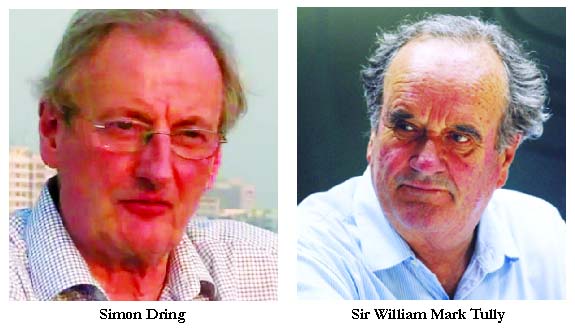
Literature Desk :
Celebrated British journalists Sir William Mark Tully and Simon Dring had their experiences during Bangladesh’s War of Independence.
Sir Mark Tully was BBC’s India correspondent in 1971 and one of Britain’s favourite broadcasters. During the war, the news media controlled by the then Pakistani junta used to carry out coverage for the military and their affiliates. Mark Tully’s coverage of the war on BBC radio was the people’s chief source of authentic information.
Covering the Liberation War of Bangladesh was a high point in Sir Mark’s career; that he did extensively for the BBC and had the fortune to watch founding father of Bangladesh Bangabandhu Sheikh Mujibur Rahman from close quarters.
London-based Daily Telegraph’s war correspondent Simon Dring was the first person who flashed out to the world the genocide carried out by the Pakistani forces on the Bengalis when Operation Searchlight was launched on the night of Mar 25, 1971.
All foreign correspondents and journalists had already been expelled from Dhaka by the military authorities and Dring was one of three correspondents who at the risk of their lives managed to stay in hiding – the other two being Arnold Zeitlin and Michael Laurent.
On Mar 30, Telegraph published Dring’s eyewitness account of Operation Searchlight. Datelined Dhaka it was called “How Dhaka paid for a united Pakistan” and Dring’s account of the army’s attack on Dhaka University was horrifying and shocking but vivid and factual.
Business groups Mohammadi Group and Ha-Meem Group of current FBCCI president A K Azad, are sponsoring the programme titled ‘Smriti 71.’
Sir Mark, who reported the assassination of Indira Gandhi, the Bhopal gas tragedy and the destruction of the Babri Mosque by Hindu fanatics at Ayodhya, was awarded one of India’s highest honours, the Padma Bhushan.
Celebrated British journalists Sir William Mark Tully and Simon Dring had their experiences during Bangladesh’s War of Independence.
Sir Mark Tully was BBC’s India correspondent in 1971 and one of Britain’s favourite broadcasters. During the war, the news media controlled by the then Pakistani junta used to carry out coverage for the military and their affiliates. Mark Tully’s coverage of the war on BBC radio was the people’s chief source of authentic information.
Covering the Liberation War of Bangladesh was a high point in Sir Mark’s career; that he did extensively for the BBC and had the fortune to watch founding father of Bangladesh Bangabandhu Sheikh Mujibur Rahman from close quarters.
London-based Daily Telegraph’s war correspondent Simon Dring was the first person who flashed out to the world the genocide carried out by the Pakistani forces on the Bengalis when Operation Searchlight was launched on the night of Mar 25, 1971.
All foreign correspondents and journalists had already been expelled from Dhaka by the military authorities and Dring was one of three correspondents who at the risk of their lives managed to stay in hiding – the other two being Arnold Zeitlin and Michael Laurent.
On Mar 30, Telegraph published Dring’s eyewitness account of Operation Searchlight. Datelined Dhaka it was called “How Dhaka paid for a united Pakistan” and Dring’s account of the army’s attack on Dhaka University was horrifying and shocking but vivid and factual.
Business groups Mohammadi Group and Ha-Meem Group of current FBCCI president A K Azad, are sponsoring the programme titled ‘Smriti 71.’
Sir Mark, who reported the assassination of Indira Gandhi, the Bhopal gas tragedy and the destruction of the Babri Mosque by Hindu fanatics at Ayodhya, was awarded one of India’s highest honours, the Padma Bhushan.

